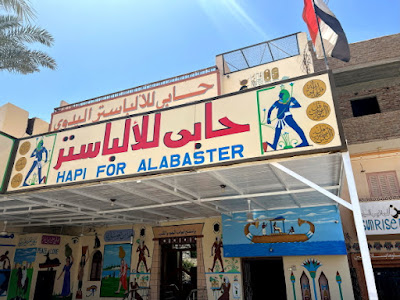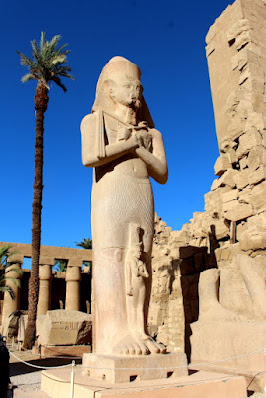Deir el-Bahri is located near Valley of the Kings and contains the Mortuary Temple of Hatshepsut, who was the most important woman to rule Egypt as a pharaoh. Hatshepsurt consolidated the country and organized expeditions to explore the land of Punt. (Modern scholars can not agree on where the land of Punt was located.)
 |
| Picture by Kolohe |
 |
| Picture by Kolohe |
 |
| Picture by Heather |
 |
| Picture by Kolohe |
 |
| Picture by Kolohe |
 |
| Picture by Kolohe |
 |
| Picture by Kolohe |
 |
| Picture by Hwather |
 |
| Picture by Kolohe |
 |
| Picture by Kolohe |
 |
| Picture by Kolohe |
 |
| Picture by Kolohe |
After leaving the alabaster factory, we drove by a large number of ruins. We did not have time to stop at all of the sites and I do not remember the names of the ones that we just drove by and photographed from our van.
 |
| Picture by Kolohe |
We did stop at the Mortuary Temple of Amenhotep III. Unfortunately, the Temple has been completely destroyed and all that remains is the Colossi of Memnan - two giant six-story high statues seated on thrones, each weighing an estimated 720 tons. These two statues originally stood guard at the temple's main gate. The statues are in poor condition and the World Monuments Fund (WMF) is now involved with preservation efforts by providing emergency stabilization funds, documenting excising conditions of the statues, and helping to develop a long-range conservation plan.
Entrepreneurs selling a variety of souvenir in the parking lot tended to be a little aggressive, but fortunately our guide "Rocky" knew how to deal with them.
 |
| Picture by Kolohe |
 |
| Picture by Kolohe |
We stopped at the Iris Restaurant for something to eat and had a nice view of the area from our patio. At most places we stopped at on this trip they served us mango drinks, which were quite tasty.
 |
| Picture by Kolohe |
 |
| Picture by Kolohe |
 |
| Picture by Kolohe |
 |
| Picture by Kolohe |
 |
| Picture by Kolohe |
Karnak in Luxor is one of the world's largest religious sites. For thousands of years pharaohs continued to built temples on the same site, resulting in a hodgepodge of structures and designs. There are several different parts to the site, but only the Precinct of Amun-Ra is open to the public.
When entering the complex, the newer structures are at the front of the site and the older structures are at the back. Many of the older structures are in poor condition because they were dismantled and some of the blocks were used to build the newer structures.
As noted in the pictures, the lower part of the obelisk of Hashepsut appears to to be a different color. This was because originally the obelisk was enclosed with a wall that protected the lower part of the obelisk.
 |
| Unknown Photographer |
 |
| Picture by Kolohe |
 |
| Picture by Heather |
 |
| Picture by Kolohe |
 |
| Picture by Heather |
 |
| Picture by Kolohe |
 |
| Picture by Kolohe |
 |
| Picture by Kolohe |
 |
| Picture by Kolohe |
 |
| Picture by Kolohe |
 |
| Picture by Heather |
Before going to the airport, we had to return to the riverboat to pick up our luggage that they were holding for us. Along the way to the riverboat Kolohe photographed a number typical street scene from our van window. After saying goodbye to our riverboat crew, we flew from Luxor to Cairo.
 |
| Picture by Kolohe |
 |
| Picture by Kolohe |
 |
| Picture by Kolohe |
 |
| Picture by Kolohe |
 |
| Picture by Kolohe |
 |
| Picture by Kolohe |
 |
| Picture by Kolohe |
 |
| Picture by Kolohe |
 |
| Picture by Kolohe |
 |
| Picture by Kolohe |
 |
| Picture by Kolohe |
 |
| Picture by Kolohe |
 |
| Picture by Kolohe |
 |
| Picture by Kolohe |
 |
| Picture by Kolohe |
ADDITIONAL PICTURES BY KOLOHE


































































































No comments:
Post a Comment